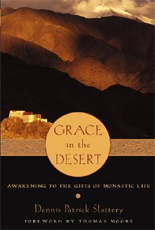"What a gift! The desert stillness held a deep mystery, forcing me further into my interior life and eliciting a profound, serene solitude. Some retreatants, I was told later, left after one night, claiming extreme boredom for lack of anything to do. The monks believed it was actually the fear of solitude and silence that drove people to seek noisier climates with more distractions to keep the loneliness at bay. Desert silence tended to push itself into me, to open me up to myself and my relation to God as no other retreat center had. The power rested in the land's silence and in the great brooding stillness of the mountains that I often gazed at from my window nook. I loved to watch the darkness descend on them in the evening as the fire behind me crackled and competed for attention. The darkness and silence of God revealed themselves here in abundance; I wondered if my soul could withstand their power for six days. This darkness met my own internal darkness and silence in a kind of sublime marriage. I felt so small in relation to its forceful presence and its sustained mystery. Silence cannot be explained or even analyzed; it is there to guide meditation and to promote contemplation of the mystery of life and of our tentative but sure connection to eternity. Silence carried its own ferocious energy.
"I found and began to read some of Father William [McNamara's] writing on mysticism and learned of the appropriate naming of this place: 'Nada is Spanish for nothing,' he writes. "The experience of nothingness lies at the heart of the whole spiritual life. It is the beginning of the mystical journey.' So to begin with nothing is to begin the true journey of a mystical life.
"I walked the grounds of the hermitage and felt the desert pulling at me, taking me into a shadowy darkness below the sun. Dryness too had its own sacred quality, so different from moistness. St. John of the Cross could have had just this geography of the soul in mind when he meditated on the aridity of the spirit. Aridity was a sign, he believed, that the senses were being purged: 'The cause of this aridity is that God transfers to the spirit the good things and the strength of the senses which, since the soul's natural strength and senses are incapable of using them, remain barren, dry and empty.' No wonder the desert in its spare, dry aridity had historically been such a powerful place of prayer, temptation, and comfort for those seeking the sacred in solitude.
"The desert was an eternal image for the soul's condition as God worked in and through it to dry out the senses and evaporate the enlarged ego. Moisture was precious, but it could also at times be an impediment to the soul's alchemy. In the dark night of dryness, I found an attractive and sought-for condition. I sensed in dry aridity an abundance; the paradox of abundance was nourishing. It left me wanting for nothing, as if the dry air had dehydrated all my wants and desires. Is there such a condition of sacred evaporation, where one dried out to desire? God is to be found in the dryness of landscape as well as in the moisture of bodies of water. Dryness seemed to dehydrate all my demands, turning them into empty husks.
"Life here was nuanced in its desertness. I realized that in walking, talking, doing things, or being busy, this subtlety evaporated into the dryness, and with it the sacred quality. Aridity had its own unique band of smells, which entered the nostrils with the grace and quickness of a field mouse's movement. I breathed in the air coming through the screened door and felt so much of what I had only been reading about: the power of presence, of being still, patient, open, attentive, watchful, where the soul was in rhythmic time and space with the life around it. God revealed himself in this subtlety, in a glimpse, a side glance, something out of the corner of the eye, or in a marvelously still instant in time; I believed the opening into eternity occurred right here, right at this moment:
SOLACE
The desert does not demand,
it does not even beckon.
What it whispers through the porous sand
and monotonous slippage of small sages,
Angel Trumpets and Yellow Peppergrass,
crawling lizards and
Kangaroo rats scuffling in its forbidding
Silence is:
"There is no place to go. No place into it and
no way out of it" —
The morning desert light
glints so much promise
and the still red fading light
casting the shadows in evening
impress on my tired dry body the same refrain:
"Really, there is no place to go."
Perhaps its heat and its ferocious
stillness I should read as oracles
Of a truth I slip in the deep sand to deny.
"There is, really, no place to go.
Now, try to sit still and I will find
a blessing for you."
If solace is silence, then I cannot breathe
hard enough to make the right sound."
